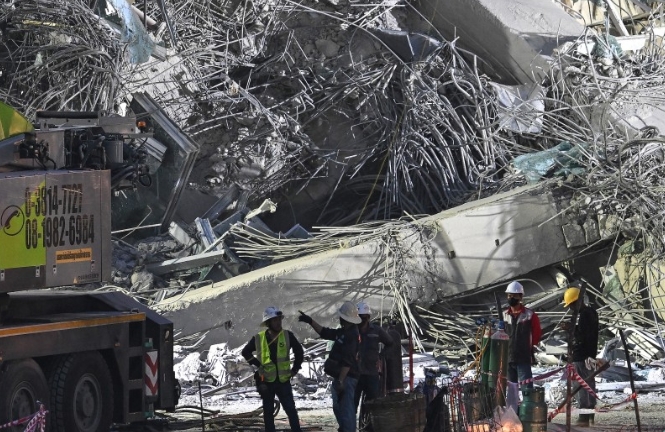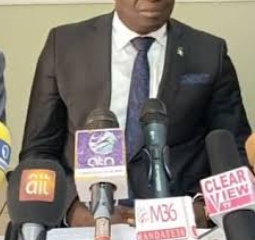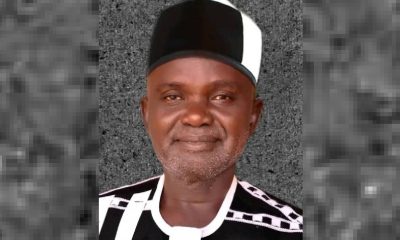Foreign
Trump administration seeks legislative backing to terminate vaccine funding

The President Donald Trump administration plans to terminate the United States’ financial support for the Global Alliance for Vaccine and Immunisation, the organization that has helped purchase critical vaccines for children in developing countries.
Some other programs terminated is funding for the United Nations Food and Agriculture Organization, which conducts surveillance for diseases that can be transmitted from animals to humans, including bird flu, in 49 countries. Some major programs to track and fight malaria, one of the world’s top killers of children, have also been ended.
Those decisions are included in a 281-page spreadsheet that the United States Agency for International Development sent to the US Congress, listing the foreign aid projects it plans to continue and to terminate.
The New York Times obtained a copy of the spreadsheet and other documents describing the plans.
For many years, developing countries have relied on GAVI support to combat malaria.
Gavi is estimated to have saved the lives of 19 million children since it was set up 25 years ago. The United States contributes 13 percent of its budget.
The terminated grant to Gavi was worth $2.6 billion through 2030.
By Gavi’s own estimate, the loss of U.S. support may mean 75 million children do not receive routine vaccinations in the next five years, with more than 1.2 million children dying as a result.
The U.S. has been among the top donors to the organization since its creation, and became the largest during the Covid-19 pandemic.
Gavi was counting on a pledge made last year by President Joseph R. Biden Jr. for its next funding cycle.
New vaccines with the promise to save millions of lives in low-income countries, such as one to protect children from severe malaria and another to protect teenage girls against the virus that causes cervical cancer, have recently become available, and Gavi was expanding the portfolio of support it could give those countries.
The loss of U.S. funds may set back the organization’s ability to continue to provide its basic range of services — such as immunization for measles and polio — to a growing population of children in the poorest countries, let alone expand to include new vaccines.
While European countries have historically provided significant funding, many are now reducing foreign aid spending as they grapple with the change in U.S. policy on Ukraine and the U.S. demand that they increase their defense spending.
Japan, another major Gavi donor, is struggling with a depreciating currency.
GAVI’s chief executive, Dr. Sania Nishtar said that she hoped the Trump administration would reconsider the decision to end its support. “Gavi’s work keeps people everywhere, including Americans, safe. In addition to protecting individual children, vaccination reduces the possibility of large outbreaks. The organization maintains global stockpiles for vaccines against diseases such as Ebola and cholera, deploying them in rapid response efforts for epidemics,” she said.
Gavi’s structure requires countries to pay part of the cost of vaccines, with their share growing as income levels rise; middle-income countries are weaned from support.
The Trump administration, according to the letter has decided to continue 898 U.S. Agency for International Development Awards and to end 5,341.
It says the remaining programs are worth up to $78 billion.
But only $8.3 billion of that is unobligated funds — money still available to disburse, because the amount covers awards that run several years into the future.
The figure shows a massive reduction in the $40 billion that U.S.A.I.D. used to spend annually.
The administration has decided to continue some key grants for medications to treat H.I.V. and tuberculosis, and food aid to countries facing civil wars and natural disasters.
The cover letter details the skeletal remains of U.S.A.I.D. after the cuts, with most of its funding eliminated, and only 869 of more than 6,000 employees still on active duty.
The memo says that 869 U.S.A.I.D. personnel were working as of last Friday, while 3,848 were on administrative leave and 1,602 are in the process of being laid off.
Of 300 probationary employees who were initially fired, 270 have returned to work following a court order prohibiting their dismissal.
A spokesperson for the State Department, which now runs what is left of U.S.A.I.D., confirmed the terminations on the list were accurate and said that “each award terminated was reviewed individually for alignment with agency and administration priorities, and terminations were executed where Secretary Rubio determined the award was inconsistent with the national interest or agency policy priorities.”
Although the administration has repeatedly said publicly that its foreign assistance review process has been concluded, the information in the documents suggests that there is still some fluidity in which programs will survive.
Staff members of one major malaria program that was terminated weeks ago, and which appears on the list of canceled projects sent to Congress, for example, were informed on Monday that it is being restored.
Nevertheless, cuts to malaria response are deep. While awards that fund the bulk purchase of bednets and malaria treatments have been preserved, many of the programs to deliver these and other malaria control efforts in individual countries such as Cameroon and Tanzania — among the most affected in the world — have been terminated.
Some organizations with awards that have not been officially canceled have received no funds for more than two months, and have folded. Without them, there is no one to take treatments from ports to local clinics, or deliver them to children.
Foreign
Myanmar Quake Victim Rescued After 5 Days

Rescuers on Wednesday pulled a man alive from the rubble five days after Myanmar’s devastating earthquake, as calls grew for the junta to allow more aid in and halt attacks on rebels.
The shallow 7.7-magnitude earthquake on Friday flattened buildings across Myanmar, killing more than 2,700 people and making thousands more homeless.
Several leading armed groups fighting the government have suspended hostilities during the quake recovery, but junta chief Min Aung Hlaing said military operations would continue — despite international criticism of multiple reported air strikes.
UN agencies, rights groups and foreign governments have urged all sides in Myanmar’s civil war to stop fighting and focus on helping those affected by the quake, the biggest to hit the country in decades.
Hopes of finding more survivors are fading, but there was a moment of joy on Wednesday as a man was pulled alive from the ruins of a hotel in the capital Naypyidaw.
The 26-year-old hotel worker was extracted by a joint Myanmar-Turkish team shortly after midnight, the fire service and junta said.
Dazed and dusty but conscious, the man was pulled through a hole in the rubble and put on a stretcher, video posted on Facebook by the Myanmar Fire Services Department showed.
Call for peace
Min Aung Hlaing said Tuesday that the death toll had risen to 2,719, with more than 4,500 injured and 441 still missing.
But with patchy communication and infrastructure delaying efforts to gather information and deliver aid, the full scale of the disaster has yet to become clear, and the toll is likely to rise.
The World Health Organization (WHO) reported severe damage in the city of Sagaing, citing local rescuers saying one in three houses there have collapsed.
Healthcare facilities, damaged by the quake and with limited capacity, are “overwhelmed by a large number of patients”, while supplies of food, water and medicine are running low, WHO said in an update.
Sagaing has seen some of the heaviest fighting in Myanmar’s civil war, and AFP journalists have not been able to reach the area.
Relief groups say the overall quake response has been hindered by continued fighting between the junta and the complex patchwork of armed groups opposed to its rule, which began in a 2021 coup.
Julie Bishop, the UN special envoy on Myanmar, called on all sides to “focus their efforts on the protection of civilians, including aid workers, and the delivery of life-saving assistance”.
Even before Friday’s earthquake, 3.5 million people were displaced by the fighting, many of them at risk of hunger, according to the United Nations.
Late Tuesday, an alliance of three of Myanmar’s most powerful ethnic minority armed groups announced a one-month pause in hostilities to support humanitarian efforts in response to the quake.
The announcement by the Three Brotherhood Alliance followed a separate partial ceasefire called by the People’s Defence Force — civilian groups that took up arms after the coup to fight junta rule.
But there have been multiple reports of junta air strikes against rebel groups since the quake.
“We are aware that some ethnic armed groups are currently not engaged in combat, but are organising and training to carry out attacks,” said Min Aung Hlaing, mentioning sabotage against the electricity supply.
“Since such activities constitute attacks, the Tatmadaw (armed forces) will continue to carry out necessary defensive activities,” he said in a statement late Tuesday.
But the UN special rapporteur on human rights in Myanmar, Tom Andrews, rejected the junta’s characterisation of its operations.
“Senior General Min Aung Hlaing has described ongoing junta attacks in the midst of Myanmar’s suffering as ‘necessary protective measures’,” he wrote on X.
“They are neither necessary nor protective. They are outrageous and should be condemned in the strongest possible terms by world leaders.”
Rescue teams work to save residents trapped under the rubble of the destroyed Sky Villa Condominium development in Mandalay on March 29, 2025, a day after an earthquake struck central Myanmar. More than 90 people could be trapped inside the crushed remains of an apartment block in Mandalay in central Myanmar destroyed by a devastating earthquake, a Red Cross official told AFP on March 29 as rescuers worked to free the victims. (Photo by Sai Aung MAIN / AFP)
Thailand toll rises
Australia’s government decried the reported air strikes saying they “exacerbated the suffering of the people”.
“We condemn these acts and call on the military regime to immediately cease military operations and allow full humanitarian access to affected areas,” Foreign Minister Penny Wong said.
Amnesty International said “inhumane” military attacks were significantly complicating earthquake relief efforts in Myanmar.
“You cannot ask for aid with one hand and bomb with the other,” said the group’s Myanmar researcher Joe Freeman.
Hundreds of kilometres away, in the Thai capital Bangkok, workers continued to scour through the rubble of a collapsed 30-storey skyscraper.
The structure had been under construction when the earthquake hit and its crash buried dozens of builders — few of whom have come out alive.
The death toll at the site has risen to 22, with more than 70 still believed trapped in the rubble.
AFP
Foreign
Badenoch cautions UK to refrain from retaliating if Trump imposes tariffs

Kemi Badenoch has cautioned Britain against retaliating if Donald Trump imposes new tariffs on UK goods as part of his “liberation day” trade measures.
The Conservative leader stressed that import levies “just make everyone poorer” and urged Labour ministers to push for a “comprehensive” trade deal.
Despite efforts by Prime Minister Sir Keir Starmer and Business Secretary Jonathan Reynolds to secure an exemption, UK goods are expected to be hit alongside other global imports.
Badenoch emphasised the need for a deal covering key industries like manufacturing, particularly steel and automotive, warning that tariffs would “severely cripple” these sectors.
“Some people will want us to have trade retaliation, that just makes everyone poorer,” she told LBC. “This is a time for significant diplomacy… the people who will suffer aren’t just our exporters but also the American consumer.”
She dismissed suggestions that the UK should distance itself from the US due to Trump’s policies, stating,
“My view is that we need to stick closely to the US, they are an ally.
“We do not want a world where Nato is fragmented, that is very bad for our national security.
“We need to do what is in our national interest; where we disagree we should say so and I don’t mind people saying where they disagree.
“But I do have a problem with people just criticising for the sake of it when they actually haven’t got a concrete example of what it is that they are talking about in terms of policy. They are expressing their personal views about an individual.
“I haven’t banned anyone from doing so but I don’t think it is right because … having people from another country endlessly criticise your government in the open is not helpful.”
Trump has already announced a 25% import tax on foreign cars, dealing a major blow to the UK auto industry, which exported over 101,000 units worth £7.6 billion to the US last year.
Additionally, new tariffs—potentially including a 20% tax—are set to take effect on April 2, targeting UK products in response to VAT rules Trump views as unfair.
These levies could disrupt the UK’s economic plans, coming shortly after Chancellor Rachel Reeves’ budget cuts aimed at stabilizing public finances.
Foreign
Journalists rally against White House’s decision to modify allocation of seats in briefing room

The White House said Monday it is “seriously considering” taking control of deciding which journalists get seats in the famed briefing room, in the latest bid by President Donald Trump’s administration to exert power over the media.
The 49 spots in the press room, where spokespeople, officials and occasionally the president take the podium, have long been allocated by the non-partisan group of independent journalists, the White House Correspondents Association.
White House Press Secretary Karoline Leavitt accused the WHCA of trying to maintain a “monetized monopoly over the briefing room.”
“As for switching up seating in the briefing room, it’s something we are seriously considering,” she told Fox News.
“The briefing room is part of the People’s House, it belongs to the American people. It does not belong to elitist journalists here in Washington DC.”
News outlet Axios reported earlier that the White House wanted to take control of the seating chart to give more prime front-of-room spots to new media, and move some legacy outlets further back.
The WHCA, of which AFP is a member, opposed the “wrong-headed” move.
“The reason the White House wants control of the briefing room is the same reason they took control of the pool: to exert pressure on journalists over coverage they disagree with,” WHCA President Eugene Daniels said in a statement.
The WHCA and the White House both said they had tried to broker a meeting on the issue.
It is the latest effort by the White House to shape who covers Trump after taking control from the WHCA in February of the “pool” that covers the president in the Oval Office and when he travels on Air Force One.
The White House has added access to the pool for new and in several cases openly pro-Trump media, while reducing access to mainstream organisations.
It also continues to bar the Associated Press news agency from almost all presidential events as it refuses to refer to the Gulf of Mexico as the “Gulf of America,” the name newly decreed by Trump.
AFP
-

 News18 hours ago
News18 hours agoTinubu Sacks NNPC Board, Appoints New Leadership
-

 News18 hours ago
News18 hours agoHe came to propose to me, and died in my hostel
-

 News11 hours ago
News11 hours agoVideo: Watch Dr Nwambu of CCLCA analyse ex-River HoS allegations against suspended Gov Fubara
-

 News17 hours ago
News17 hours agoAkpabio, Yahaya Bello Conspired To Assassinate Me – Senator Natasha Makes Fresh Allegation
-

 Business6 hours ago
Business6 hours agoBank stops transfer fees on online transactions
-

 Sports17 hours ago
Sports17 hours agoSuper Eagles Must Defeat South Africa to qualify for 2026 World – Eric Chelle
-

 Sports18 hours ago
Sports18 hours agoSaka scores as Arsenal beat Fulham to close gap on Liverpool
-

 News17 hours ago
News17 hours agoWike sympathies with Ortom over younger brother’s death






